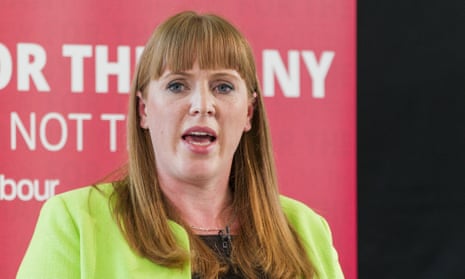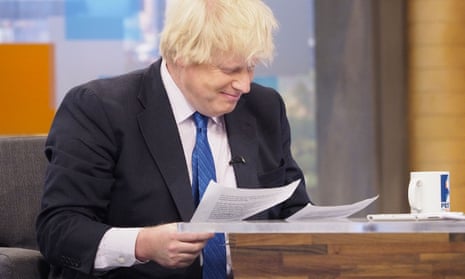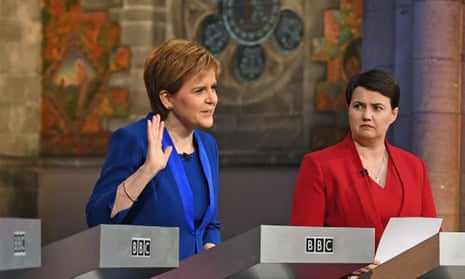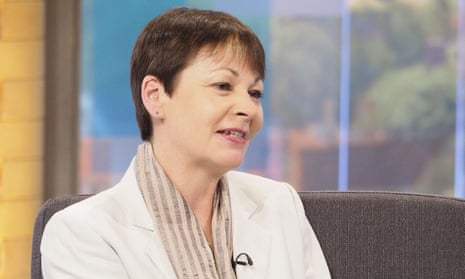Clegg says young people voted in overwhelming numbers last year. They have been ignored. Brexit is an act of generational theft, he says.
General election 2017: Theresa May struggles to defend 'dementia tax' U-turn in BBC interview – as it happened
Andrew Neil grills PM on day that she was forced into a major climbdown over the plans for social car laid out in her manifesto
Mon 22 May 2017 15.33 EDT
First published on Mon 22 May 2017 01.45 EDT- May insists she is being honest with voters after 'dementia tax' U-turn
- Andrew Neil interviews Theresa May
- A social care U-turn reading list
- Ed Miliband says May's social care U-turn comments show she's a liar
- Dilnot says new cap on social care costs should not be much more than £72,000
- Guardian/ICM poll shows Tory lead over Labour down to 14 points
- Labour says social care U-turn illustrates 'weak and unstable leadership'
- What May's social care U-turn means for the election – snap analysis
- May's Q&A
- Why May's comment about Corbyn making 'fake claims' about Tory manifesto is not true
- May confirms Tories would cap costs in major social care U-turn
- Theresa May's speech
- Tories to perform U-turn over social care and impose cap on costs, Osborne says
- Labour announces plans for £1bn cultural capital fund
- Green party manifesto launch
- May condemns politicians for issuing 'hysterical warnings' about Brexit
- Pound hit by 'dementia tax' backlash
- Rayner claims May 'sneers' at her in the Commons
- Nick Clegg's Today interview.
- Angela Rayner Today interview
- Registration to vote closes today
- The Snap: your election briefing
Live feed
- May insists she is being honest with voters after 'dementia tax' U-turn
- Andrew Neil interviews Theresa May
- A social care U-turn reading list
- Ed Miliband says May's social care U-turn comments show she's a liar
- Dilnot says new cap on social care costs should not be much more than £72,000
- Guardian/ICM poll shows Tory lead over Labour down to 14 points
- Labour says social care U-turn illustrates 'weak and unstable leadership'
- What May's social care U-turn means for the election – snap analysis
- May's Q&A
- Why May's comment about Corbyn making 'fake claims' about Tory manifesto is not true
- May confirms Tories would cap costs in major social care U-turn
- Theresa May's speech
- Tories to perform U-turn over social care and impose cap on costs, Osborne says
- Labour announces plans for £1bn cultural capital fund
- Green party manifesto launch
- May condemns politicians for issuing 'hysterical warnings' about Brexit
- Pound hit by 'dementia tax' backlash
- Rayner claims May 'sneers' at her in the Commons
- Nick Clegg's Today interview.
- Angela Rayner Today interview
- Registration to vote closes today
- The Snap: your election briefing
John Humphrys is interviewing Nick Clegg. The interview is focusing on voter turnout.
Q: It’s your fault, isn’t it? (Clegg was in charge of constitutional reform in the coalition government)
Clegg says politicians always get blamed. We were told the election would be about Brexit. But Theresa May only wants to talk about herself, and Jeremy Corbyn wants to talk about anything but Brexit.
He says elections have become a form of displacement activity.
Q: People say politicians make promises they don’t keep, as you did over tuition fees.
Clegg accepts that. He says Labour is now promising lots of goodies.
Q: Presumably you approve of the Labour policy.
Clegg says Labour introduced them in the first place. He says he does not think Labour could pay for its promise. And he thinks it is the wrong choice now. It would cost £9bn, with some of the money coming from people who don’t go to university. And Labour is not reversing all the benefits cuts. He says he would make that his priority, not getting rid of tuition fees.
- Clegg claims Labour could not fund its latest tuition fee abolition policy.
Nick Clegg's Today interview.

Good morning. I’m taking over from Claire.
Nick Clegg is about to be interviewed on the Today programme.

I’m handing over the live blog now to Andrew Sparrow to steer you through the rest of the day.
To have the Snap election briefing deposited in your inbox tomorrow, and every weekday, morning, do sign up here.
Sinn Féin’s John O’Dowd has been speaking to the Today programme; the party launches its manifesto today, though its MPs do not take up their seats in Westminster.
A central part of Sinn Féin’s manifesto is concern over the future of the soft border between Northern Ireland and the Irish Republic once Brexit happens. It is calling for NI to have an “EU-designated special status” that would retain a link between the two.
O’Dowd says:
The EU played a role in bringing that conflict to an end …
What we’re seeking is continued representation in the European parliament under the north-south ministerial council … that we’d still be able to access council meetings, that we’d still be able to access funding.
Access to the European court of justice would be part of any deal, he says.
He says such a move would not mean there would need to be a border poll, though Sinn Féin of course still supports such a referendum:
We’re not suggesting at this stage that sovereignty would change.
Rather, he says, it reflects the fact that Northern Ireland did not vote leave:
The majority of people here voted to stay within the EU – that vote was across unionism and nationalism.
And he says there’ll be no change to the policy of not taking up Westminster seats:
Westminster is not a listening bureau … There is no example I can look at … where Irish nationalists have been able to influence the actions in Westminster.

People could get a universal basic income and a shorter working week under plans to be proposed by the Green party on Monday.
Caroline Lucas, the party’s co-leader, said the proposals were “big, bold ideas to create a confident and caring country we can all be proud of”.
The party’s flagship pledges, called their “green guarantee”, would reverse the privatisation of the NHS and fill the funding gap in the health service, paid for partly by scrapping the UK’s Trident nuclear deterrent.
It would also promise another referendum when Britain strikes its Brexit deal and guarantee EU citizens rights.
But its most radical proposals are a promise to work towards the introduction of a universal basic income – a flat rate paid to everyone whether or not they are in work.
A universal basic income is regarded by some on the left as a response to the robotisation of the workforce, which it is feared could replace lower-skilled jobs and exacerbate inequality
The Greens said the proposal would initially take the form of a government-sponsored pilot scheme and the phasing in a of a shorter working week.
And with Labour having promised to scrap university tuition fees if elected, the Greens last week went one step further, with a pledge to write off all existing student loan debts, at a cost of more than £14bn over the next parliament.
Angela Rayner Today interview
Angela Rayner, the shadow education secretary, has been speaking to the Today programme about the tuition fee pledge. She confirms:
As of September, students going to university will not pay tuition fees.
Rayner says that adds up to a cost of £9.5bn annually, or £11.2bn if you add in maintenance grants:
We believe that’s a small price to pay for ensuring young people are not saddled with £45,000 in debt.
She says Labour has accounted for this in its manifesto:
That extra money is within the overall costings that we have … The Conservatives have not produced any costings.
We’re quite clear in ours … There is room within that.
Having promised to scrap fees, it had to be done as soon as possible, Rayner says:
We don’t want students to defer from this year.
Against accusations that scrapping fees for all students actually benefits the better-off, Rayner says that even if fees are not paid back (if the graduate does not meet the earnings threshold) it still has a negative effect:
The most disadvantaged students … have this hanging over their heads for longer.
If you’ve ever had a huge amount of debt hanging over your head, you know how that feels.

Registration to vote closes today
With the deadline tonight for voters to register for the 8 June election, the Electoral Commission says 15% of those eligible – that’s 7 million people – are not signed up.
It says more than 2.3m applications to register have been received since the snap election was called – although some of those people will already have been on the electoral roll.
Last year, as the midnight cut-off to register for the EU referendum approach, the website crashed as last-minute applications surged, forcing an extension to the deadline.
Those who haven’t yet put their names down (and I’m going to guess that most readers of a politics live blog have done so), can do it online here. That’s not for readers in Northern Ireland, unfortunately: you’ll need to download a form from this site and take it to your local area electoral office.
Jeremy Corbyn will say today that under a Labour government, university tuition fees would effectively be scrapped from autumn this year. Effectively because legislation to abolish the fees wouldn’t be implemented before the start of the academic year, but for the year starting autumn 2018. Mindful that that could lead to a stampede of deferments from this year’s intake – as well as a few “not fair”s – Corbyn will say that students starting courses this year would have their first tranche of fees retrospectively written off.
Those already studying would not have to pay from autumn 2018 onwards.
Labour is hoping that today’s announcement will bounce more young people into registering to vote: the deadline is 11.59pm today and you can sign up here.
The Snap: your election briefing

Welcome back to the antepenultimate week of campaigning – and the last day on which you can register to vote – before polling day. I’m Claire Phipps with your whip-through of the morning’s election news; Andrew Sparrow picks up the live blog later. Do join us in the comments or on Twitter @Claire_Phipps.
What’s happening?
It turns out there was something Theresa May could do to prod her polling lead over Jeremy Corbyn down to single figures, and that something was the manifesto commitment to require older people to fund their own social care from all assets over £100,000. Or, as it’s become more snappily if not cheerily nicknamed, the dementia tax.
Labour leaflets have swiftly sprung up promising to “fight the Tories’ unfair dementia tax”, and Liberal Democrat leader Tim Farron has labelled it “Theresa May’s poll tax”, amid warnings the proposal is unworkable and chatter that the proposal is not playing well on the doorstep – up to now the PM’s safe space.
Lurching to its defence yesterday came foreign secretary Boris Johnson, who said the policy was not set in stone (“I do understand people’s reservations … there will be a consultation on getting it right”); and work and pensions secretary Damian Green, who said it was (“We have set out this policy, which we’re not going to look at again.”). Who to believe? Given that Johnson clearly attended an alternate Conservative launch, with a manifesto that included within its pages the bus-tastic £350m a a week for the NHS – “It is. It is. Theresa May, she said it at the launch of the manifesto,” he burbled yesterday – we can probably place his assurances in the piffle pile.

With reports that cabinet ministers were not told about the plans much before the ferociously upbeat “you don’t have to sell your house! (until you’re dead)” pre-briefings for the manifesto, perhaps we shouldn’t be surprised that they’re still a little hazy on it. Certainly, the PM forgot to mention the social care policy in her lengthy Facebook post comparing her own manifesto with Labour’s, “written and shaped by a leader who doesn’t understand – or like – our country”.
Time, surely, to sound the red, white and blue Brexit klaxon. May will be in Wales today, instructing voters that, with talks on Britain’s EU exit due to begin less than a fortnight after the election:
There will be no time to waste and no time for a new government to find its way. So the stakes in this election are high.
So tricky, isn’t it, when an election just happens to fall right before such a key date?
Brexit also dominated last night’s BBC debate in Scotland, as six party leaders who (mostly) are not standing for Westminster election tussled over what would happen to a country that didn’t vote to leave the EU. Scottish Conservative leader Ruth Davidson accused her SNP counterpart of not knowing her place:
Nicola Sturgeon says she wants a seat at the Brexit table, but she wants Scotland to be out of the UK and into the eurozone. I ask myself, which side of the table does she want to be sat on?
But Sturgeon wasn’t engaging in this musical chairs without an adversary, pointing out that Davidson had been a remainer, then a fan of Scotland staying in the single market, before converting enthusiastically to the harder Tory line:
First she said we needed a seat at the negotiating table and now she has changed her mind. It seems to me that Ruth Davidson does everything that Theresa May tells her to do.

Scottish Labour – wilting in the Scotland-wide polls in third place on 19% – will launch its manifesto today (along with its Welsh counterpart, the Welsh Conservatives, Sinn Féin and the UK Greens, who are heralding a universal basic income).
Jeremy Corbyn has more to trumpet today, too, with an enticement that a Labour government could scrap university fees as early as this autumn, and plans for a £1bn fund to invest in the arts. He previewed this with an appearance at the Wirral Live music festival, opening for the Libertines with a selection of his greatest hits.
It went better than his appearance on Sky News on Sunday, where some of his older material got an airing. Did he condemn the IRA? After five or so feints, he went with a yes:
I condemn all the bombings by both the loyalists and the IRA.
It can be hard to keep track of what politicians believed then and now. Take the PM. Only last year, it seems, she was a remainer. But today she’ll praise the vote-leavers of Wales for paying no heed to all those naysayers:
People here in Wrexham and across Wales chose to ignore the hysterical warnings of Labour, Plaid Cymru and Liberal Democrat politicians in Cardiff Bay, and voted to leave the EU.
Welsh Conservative leader Andrew RT Davies did urge a vote to leave. But those who can raid their memories of 2016 might recall some – even quite prominent – Tories on the side of those “hysterical” warning-mongers.
At a glance:
- NHS funding pledges by major parties would still fall short, experts say.
- Labour risks losing more minority ethnic voters to Tories, study finds.
- Candidates hold one-hour pause in campaigning to remember Jo Cox.
- Frank Field: if Labour loses, a new leader must be chosen by the PLP alone – with Corbyn’s manifesto as the starting point.
Poll position
Weekend polling – and a fresh survey this morning – show the Tory lead over Labour is thinning. A telephone poll by Survation for ITV’s Good Morning Britain, published today, puts that lead at nine points: half what it was a week ago. The Conservatives have mislaid five points to 43%, with Labour perking up five to 34%, and the Lib Dems right where they were on 8%.
YouGov for the Sunday Times also pegged the lead at nine points, with Team Theresa May down one point to 44% in the wake of the manifesto, and Labour up three to 35%.
But elsewhere, it was still a double-figure lead. A separate Survation poll for the Mail on Sunday had a 12-point advantage (46% v 34%), as did ORB for the Sunday Telegraph, on the same percentages. An Observer/Opinium poll has it at 13 points: that’s down six for the Tories from last month and up seven for Labour.
The Lib Dems don’t crack double digits in any of them.
Diary

- An ostentation of manifestos today: the “Green guarantee” with co-leaders Caroline Lucas and Jonathan Bartley at 10.30am in London; Kezia Dugdale presents the Scottish Labour version at 11am in Edinburgh; the Welsh Conservatives’ launch in Wrexham follows swiftly after that, guest-starring Theresa May; then it’s Flintshire at 12.30 for Carwyn Jones’ revelation of the Welsh Labour paperwork. Sinn Féin also spells out its plans today.
- Jeremy Corbyn and Tom Watson are in Hull, the 2017 city of culture, for their arts manifesto.
- At 7pm, Andrew Neil interviews Theresa May on BBC1.
Read these
In the Guardian, Gary Younge says Corbyn is now Labour’s best hope for the future:
Herein lies one of the two key problems with the ‘anybody but Corbyn’ brigade. First, they don’t have ‘anybody’. Corbyn’s leadership does come up on the doorstep as a problem – but Owen Smith or Liz Kendall do not come up as solutions. There is no charismatic standard-bearer waiting in the wings. Second, even if they did have a candidate, they do not have an agenda. For a while it wasn’t obvious that Corbyn did either…
The manifesto has had an almost therapeutic effect. Beyond reintroducing basic social democratic policies to the arena, it provides the clearest illustration yet of what the last two traumatic years within the Labour party have been about. This unexpected left turn in the party’s leadership was, it turns out, not about delivering the party to Hamas, but delivering decent public services and a programme for tackling inequality.
In the Times, Libby Purves says the Tory manifesto is right to expect older people to contribute to the care they need:
It’s a bold move, and though tweaks and explanations are needed, a necessary one. Those shouting ‘dementia tax’ – often panicking Conservative candidates – are closing their eyes to two things. One is the reality of an ageing population. The other is that the present low, underpaid standard of home care simply will not do…
If an old person needs home care – let me speak, I’ll be one sooner than many who read this – then for heaven’s sake let the damn house contribute. For my generation it is a piece of accidental, unearned bunce anyway: we just wanted somewhere to live and had no idea it would become a moneybox.
Revelation of the day
Ukip will slip out its manifesto on Wednesday but leader Paul Nuttall doesn’t seem that concerned about using it as a springboard to power. Pressed yesterday on how much influence a party polling around 2%, standing in far fewer seats than last time, and with little chance of regaining a toehold in Westminster could wield, Nuttall insisted:
It doesn’t really matter how many MPs that you have.
The day in a tweet
You’re clearly electorally switched-on enough to be reading a campaign briefing but just in case:
The deadline to register for the #GE2017 is Monday. Don’t miss your chance! Register now at https://t.co/XyCsSZbKim #YourVoteMaters pic.twitter.com/tnjAq9KDbP
— Your Vote Matters (@YourVote_UK) May 18, 2017
And another thing
Would you like to wake up to this briefing in your inbox every weekday? Sign up here!
Comments (…)
Sign in or create your Guardian account to join the discussion